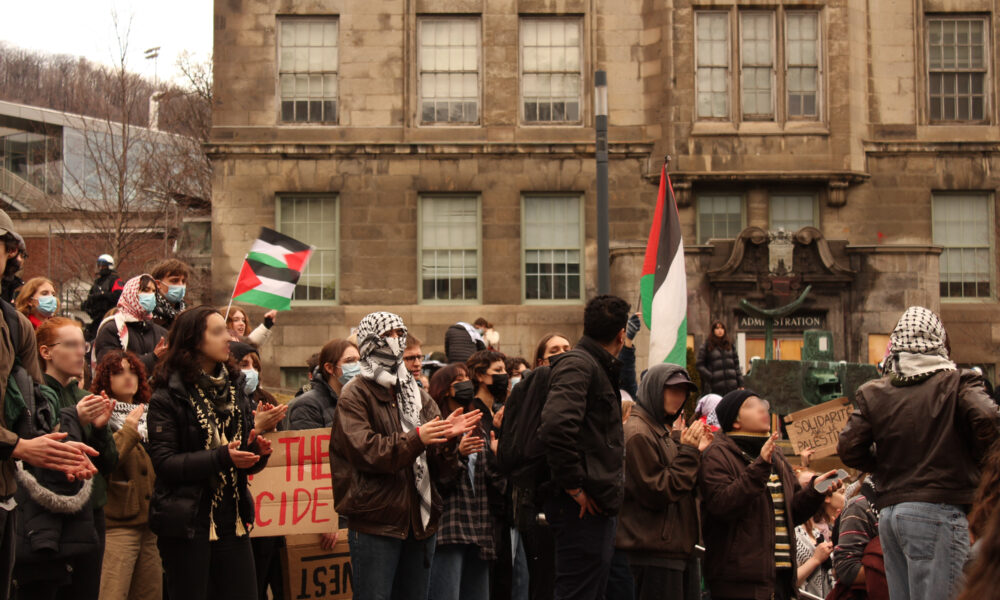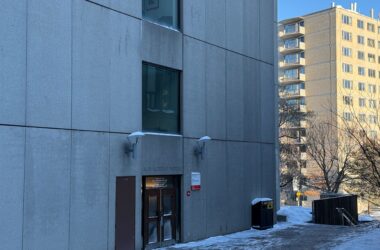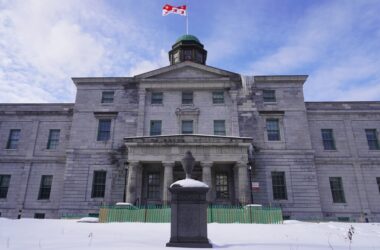McGill filed a court order over the summer of 2025 for an injunction that would permanently ban any protests on campus that block access to buildings, ‘bother’ staff, or make noise which disrupts classes. The proposal would enforce indefinitely the mandates of the 10-day provisional injunction passed by the Quebec courts in April 2025; this injunction was granted in response to three-day demonstration programming scheduled by Students for Palestine’s Honour and Resistance (SPHR) during a student strike for Palestine. If the new injunction is passed, only public demonstrations which do not impact McGill students, faculty, or property in the operations of daily life could not be penalized in court.
The Association of Graduate Students Employed at McGill (AGSEM) joined the team of McGill community members seeking to fight the injunction in court, citing that while the injunction specifically targets pro-Palestine activists, it could easily be used against other student groups in contract negotiations.
AGSEM Co-President Dallas Jokic stated in an interview with The Tribune that the injunction’s mandates are broad enough to be used against any public demonstration on campus, making it nearly impossible to conduct meaningful strike action.
“I think it’s no secret that McGill wants to make people nervous,” Jokic said. “They want people to think twice about going out to a protest. They want to discourage people from speaking up against their policies, whether it’s a refusal to divest from Israel or corporations complicit in genocide, or whether it’s a labour union that’s protesting against jobs being cut.”
Further, Jokic criticized the evidence McGill’s law team used in court while seeking the injunction. While the injunction would prevent everyone on campus from holding protests, Jokic asserts that the only evidence McGill has used to justify it pertains to the primary defendant, SPHR.
In a written statement to The Tribune, McGill’s Media Relations Office (MRO) stated that the university is committed to “freedom of expression”.
“The University is seeking, through these proceedings, to uphold […] peaceful assembly while protecting the rights of students to continue their academic journey without obstruction,” the MRO wrote.
The Association of McGill Professors of the Faculty of Arts (AMPFA) is the main arguing party against the injunction in court. Associate professor of the Department of Sociology, Barry Eidlin, told The Tribune that AMPFA believes it is imperative that students oppose this proposal vocally, as, if passed, it would detract from the learning environment at McGill by stifling the right to free speech.
Eidlin further stated that McGill itself has disturbed regular campus activities for demonstrations, such as cancelling classes on the anniversary of Oct. 7, 2023, demonstrating that the concern behind the injunction is not about preserving students’ schedules. He also argued that the way the April injunction was enforced by McGill demonstrates how increased security on campus creates a more dangerous environment for students.
“[The April 2025 injunction] basically meant turning the campus into a police state,” Eidlin said. “My students did not feel safe in that environment, and I did not feel safe in that environment, and my colleagues of colour did not especially feel safe in that environment, because several of them were disproportionately targeted by those security agents.”
The Quebec Public Interest Research Group (QPIRG) Outreach Coordinator Nelly Wat expressed their concerns about the injunction to The Tribune, writing that the broadness of the proposal would allow McGill to penalize peaceful actions, such as distributing flyers, to the same degree as vandalism.
“It is apparent that for the McGill administration, student protests are always wrong in the moment, but celebrated much later, when it becomes favourable for them to take a stance on a particular political issue,” Wat said. “One wonders if they’re ever going to tire of being on the wrong side of history.”
Eidlin further told The Tribune that, if passed, this injunction would mark a shift away from academic freedom and towards willful ignorance at McGill that would hinder students’ rights to an inclusive and accepting learning environment.
“The remedy that [McGill is] proposing for creating a peaceful environment is, for many members of the campus community, creating the exact conditions they claim to be trying to prevent,” Eidlin said.









